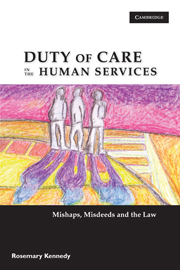Book contents
- Frontmatter
- Dedication
- Contents
- Acknowledgements
- Author's note
- Part 1 Positioning and mapping the territory of human service mishaps and misdeeds
- Part 2 Mishaps and misdeeds through a law lens
- Chapter 3 Public law of general application
- Chapter 4 Public law of particular relevance to the human services
- Chapter 5 Private law and suits
- Chapter 6 Private law – negligence
- Chapter 7 Private law – other torts and civil actions
- Chapter 8 Legal processes, quasi and indirect legal scrutiny
- Part 3 Mishaps and misdeeds through a human services lens
- Part 4 Mishaps and misdeeds through a unified lens
- Appendix: Finding the law and cases
- References
- Index
- References
Chapter 3 - Public law of general application
from Part 2 - Mishaps and misdeeds through a law lens
Published online by Cambridge University Press: 05 June 2012
- Frontmatter
- Dedication
- Contents
- Acknowledgements
- Author's note
- Part 1 Positioning and mapping the territory of human service mishaps and misdeeds
- Part 2 Mishaps and misdeeds through a law lens
- Chapter 3 Public law of general application
- Chapter 4 Public law of particular relevance to the human services
- Chapter 5 Private law and suits
- Chapter 6 Private law – negligence
- Chapter 7 Private law – other torts and civil actions
- Chapter 8 Legal processes, quasi and indirect legal scrutiny
- Part 3 Mishaps and misdeeds through a human services lens
- Part 4 Mishaps and misdeeds through a unified lens
- Appendix: Finding the law and cases
- References
- Index
- References
Summary
RELATIONS BETWEEN LEVELS of government and between government and citizens are regulated by public law. In public law, cases are brought by the state against citizens, or by citizens against the state, when either has not met their public law duties. Although the historical distinction between public and private law is now blurred, as is the distinction between state and private entities, it is still useful for setting the parameters of this chapter. This chapter considers statutory law concerning public order and offences against the state. Human service actors are potentially subject to public law of general application in society.
CRIMINAL LAW
In every jurisdiction in Australia, common law and legislation designate as offences certain commissions, omissions and states, generally accompanied by mental intention (mens rea), or recklessness or criminal negligence. Human service workers (and sometimes agencies) who engage in conduct proscribed by this law (eg dishonesty, causing death, physical violence, sexual contact, drug activity, corruption in public office) may find themselves the subject of charges prosecuted by the state.
Although criminal laws apply generally in society, increasingly they include special provisions for people in positions of trust, such as human service workers. For example, s 49 (5) and (6) of the Criminal Law Consolidation Act 1935 (SA) make it an offence, and allow for imprisonment for 10 years, for guardians and teachers to have sexual intercourse with a person under 18 years of age, or for anyone to have sexual intercourse knowingly with someone who has an intellectual disability, such that they cannot understand the consequences of sexual intercourse.
- Type
- Chapter
- Information
- Duty of Care in the Human ServicesMishaps, Misdeeds and the Law, pp. 49 - 67Publisher: Cambridge University PressPrint publication year: 2009



